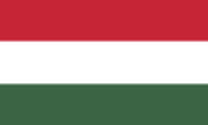- The official name of the country is Magyarország in Hungarian.
- Etymology. The name Hungary is probably from Medieval Latin Hungaria, from the ethnonyms (H)ungarī, Ungrī, Ugrī. The addition of an h- is most likely due to early associations with the Huns who had settled Hungary prior to the Avars.The Hungarian name for their people is magyar, from from magyeri, one of the seven major semi-nomad ic Hungarian tribes. The first element "Magy" is probably from the Proto-Ugric mäńćk, meaning "man, person". A common folk belief is that Magyar was derived Prince Muageris.
- History. The Hungarians were nomads who probably came to the area from the Ural Mountains. In the 13th century the Mongols destroyed much of the country and half of the population were either killed or enslaved. After the invasion King Béla had a system of stone castles built that repelled further invasions.
- Geography. Hungary is a landlocked country in Central Europe. It is mostly flat, more than half of it part of the Great Hungarian Plain east of the Danube River. It is slightly smaller than Indiana. The countries of Austria, Croatia, Romania, Serbia, Slovakia, Slovenia, and Ukraine border Hungary.'
- Sports. Hungary is the most successful nation that has never hosted the summer Olympics. Hungary's Golden Football Team (soccer) was undefeated for 30 matches in a row between 1950 and 1954.
- Budapest. The capital of Hungary is a mix of the old and the new: Turkish baths and springs, cultural events, children's activities, and good food.
- Lake Balaton. Known as the "Hungarian Sea" Lake Balaton is the largest lake in Central Europe. It's yellow-green water and the "silky" mud are reported to be "remedies for nervous complaints, anaemia and nervous fatigue."
- Hortobágy is the largest continuous natural grassland in Europe. The Hortobágy National Park is Hungary's largest protected area. It is a unique example of the coexistence of people and nature. One of the most spectacular sights is the migration of the cranes in the autumn; tens of thousands of Cranes!
FRUA is a service-marked acronym of Families for Russian and Ukrainian Adoption in use since 1994. It and the full organizational name,
Families for Russian and Ukrainian Adoption, are not to be used to describe any organization or service not related to FRUA, without permission.
Families for Russian and Ukrainian Adoption, are not to be used to describe any organization or service not related to FRUA, without permission.
© 2023 Families for Russian and Ukrainian Adoption Including Neighboring Countries






